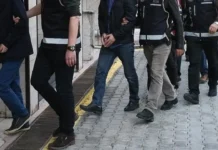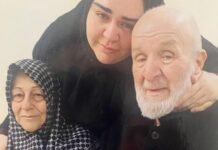A woman who was among five Turks pushed back to Turkey by Greek authorities a week ago Friday says they experienced humiliation and disappointment in Greece.
The asylum seekers, who crossed the Evros River, the land border between Turkey and Greece, to flee President Recep Tayyip Erdoğan’s relentless crackdown on dissent, were immediately apprehended by Turkish soldiers following the pushback. Turkish authorities detained four people and inexplicably released one of them.
Speaking to the Stockholm Center for Freedom, the woman, who wanted to remain anonymous and was the only one released from the group, said they were harassed in Greece by an armed and masked group that confiscated their belongings and pushed them back to Turkey, where the authorities imprisoned them on bogus terrorism charges.
She was a former high school teacher who was dismissed from her job in September 2016 and was sentenced to two years in prison in 2021 due to her alleged links to the faith-based Gülen movement. She was released pending appeal and banned from travel.
Erdoğan has been targeting followers of the Gülen movement, inspired by Turkish Muslim cleric Fethullah Gülen, since the corruption investigations of December 17-25, 2013, which implicated then-prime minister Erdoğan, his family members and his inner circle.
Following a coup attempt on July 15, 2016, the Turkish government declared a state of emergency and carried out a massive purge of state institutions under the pretext of an anti-coup fight. More than 130,000 public servants, including 4,156 judges and prosecutors, as well as 24,706 members of the armed forces, were summarily removed from their jobs for alleged membership in or relationships with “terrorist organizations” by emergency decree-laws subject to neither judicial nor parliamentary scrutiny.
Thousands of post-coup crackdown victims had to leave the country illegally because the government had revoked their passports.
The woman could not find a job following her dismissal and was isolated within the society as a person who was labelled a member of the Gülen movement. After she was sentenced in 2021, she decided to leave Turkey and reunite with her husband and children, who had already found shelter in Germany.
Former public servants were not only fired from their jobs; they were also banned from working again in the public sector and getting a passport. The government also made it difficult for them to work formally in the private sector. Notes were put on the social security database about dismissed public servants to deter potential employers.
The woman had also tried to flee Turkey in June 2021 but was pushed back then as well, experiencing mistreatment in Greece at that time, too.
She said the group spent a day on an island on the Greek side of the river. They weren’t able to leave the island since it was not close enough to the shore. They had to wait for help from “Greek security people.”
“When a boat arrived at the island in the evening, everyone was very happy to see Greek security people on board. We got on the boat and reached land,” she said.
According to the woman, a black vehicle was waiting for them when they arrived. Three masked and armed men got out of the vehicle. They summoned the men and searched them first and left the women for later. During the search, they took all their belongings and threw away the medication of a man who had diabetes.
Stating that what they experienced was shocking and embarrassing, she said, ”These people were very harsh and angry. They harassed us while they searched us. They grabbed my genitals and squeezed my breasts very hard several times. They laughed and sang while doing this. They treated the other woman in the group the same way. This was really harassment.”
After a while they were brought to the riverbank and were sent back to Turkey in a boat with other refugees.
After walking for hours in cold and mud in Turkey, a gendarmerie vehicle stopped them. “When we arrived at the gendarmerie station, we asked for blankets or dry clothes since we were totally soaked. ‘Nothing for the FETÖ terrorists!’ they told us,” she said.
FETÖ is a derogatory term coined by the Turkish government to refer to the faith-based Gülen movement as a terrorist organization.
Two men in the group were severely beaten at the station, and later four people except her were detained, she said.
“I was expecting to reunite with my family. But I cannot describe my disappointment over the things we experienced in Greece,” she said.
In a previous interview with the Stockholm Center for Freedom, pushback victims said most people who were pushed back from Greece were arrested and subjected to poor prison conditions, or they have to live in fear until they are arrested again.
The United Nations Refugee Agency, members of the European Parliament and human rights watchdogs have repeatedly demanded that Greek authorities investigate such incidents of pushback.
According to Amnesty International, the practice of migrant pushbacks in Greece has become so bad that even people who have applied for asylum and have been in the country for some time are being picked up and deported.
Refugee and volunteer reports compiled by the Aegean Boat Report show that between January 1, 2017 and September 27, 2022, 1,624 boats with 43,476 people on board were forced back from Greek islands into Turkish waters.
EU Home Affairs Commissioner Ylva Johansson during a visit to Greece in March called on the country to “do more” to investigate the allegations. However, Greek Migration Minister Notis Mitarachi denied Greek authorities’ involvement in any kind of pushback.
All those pushback victims fleeing persecution in Turkey made it to Greece by crossing the land or sea border. They shared their locations with lawyers or family members via messaging apps, or sent pictures and videos of themselves in Greece, in a bid to prove that they had arrived in Greek territory and to avoid being returned to Turkey.















